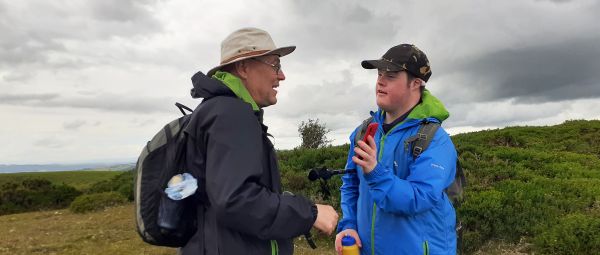Walking with dementia
Jane explains how walking has been a comfort for her and husband Geoff since his dementia diagnosis

Moving to the coast
My husband Geoff and I retired to Swanage about 12 years ago having spent a lot of our adult lives in Norfolk. I’m 70 and Geoff is 71 years old. We have two grown up children who live in other parts of the country, who we get to see as much as we can. We love living by the sea now.
I was a university careers advisor, lastly in Bournemouth. Geoff was a self-employed business consultant. Eventually Geoff’s consultancy work dried up and he volunteered as a business advisor with a group who were planning to set up a secondary school in Swanage. The school is now extremely successful and thriving. Geoff became Head of the Governors, but in 2016, in his mid-60s, he started showing signs of dementia. There was a family history of dementia, so we were alert to the signs.
Walking helps Geoff's dementia
We have always walked and loved walking. We have always lived in lovely places for walking. We’ve walked alone and with friends. We’ve also done loads of walking holidays. We’ve been to places like Italy and Tenerife, and they became our favourite kind of holidays.
Walking has always been an easy way to chat. Geoff is quite an introvert so walking together has always been a time to talk. When you are walking you are looking out around you. You’re not face to face. So if things were difficult or we’d had a bad day we’d always try and go for a walk. Geoff was a keen amateur birdwatcher too so that was another aspect of our walks.
Walking is the one thing in our life still that feels more or less normal. It’s a bit of a lifeline for us. Personally, it feels normal because it is something we’ve always done. I guess Geoff feels the same, although it’s difficult for him to say now how he feels about things. But he definitely always enjoys a walk. If we’ve had a difficult day I will suggest we go out for a walk and Geoff always says yes.
We haven’t really changed how we walk since the diagnosis. We still do six- or seven-mile walks. Every day we walk the mile into town and back. Geoff’s pace has slowed slightly but actually when we go on an organised walk, we realise we do still walk quite fast. Geoff also goes out for short walks with friends, just for an hour or so. It means I can go to my choir, and it gives me a bit of respite.
Challenges and looking to the future
One challenge we sometimes face on our walks is stiles. We went on a really good walk towards Kimmeridge, but Geoff had difficulty in getting over some of the stiles. They were in such a bad state. That kind of challenge also upsets him, and it did make me think about how Geoff will be able to cope in the future. I do really hope we will be able to stay active. It also made me think how important accessible stiles are, which I hadn’t really thought about before.
There are lots of people like me around here who have caring responsibilities and so it would be great if we could set up something where we could walk together. For us I’d want it to be a decent walk, a proper ramble! Walking is a great way to spend time outside, to connect with nature and to boost your Vitamin D levels. It’s important for all of us and that includes people with dementia. I can’t recommend it enough really. It’s so good for the soul.

Walking for health
From living with a heart condition in his mid-20s to completing a 100km walk, Will values walking as a way of staying fit and well.

Sunday ‘Big Walks’ with my learning disabled son
Ramblers member Alan shares with us his experiences of walking with his son Eddie who has Downs Syndrome.

Walking to catch up with friends
Anjum shares how walking in nature in North London helps her relax and keep in touch with family and friends.